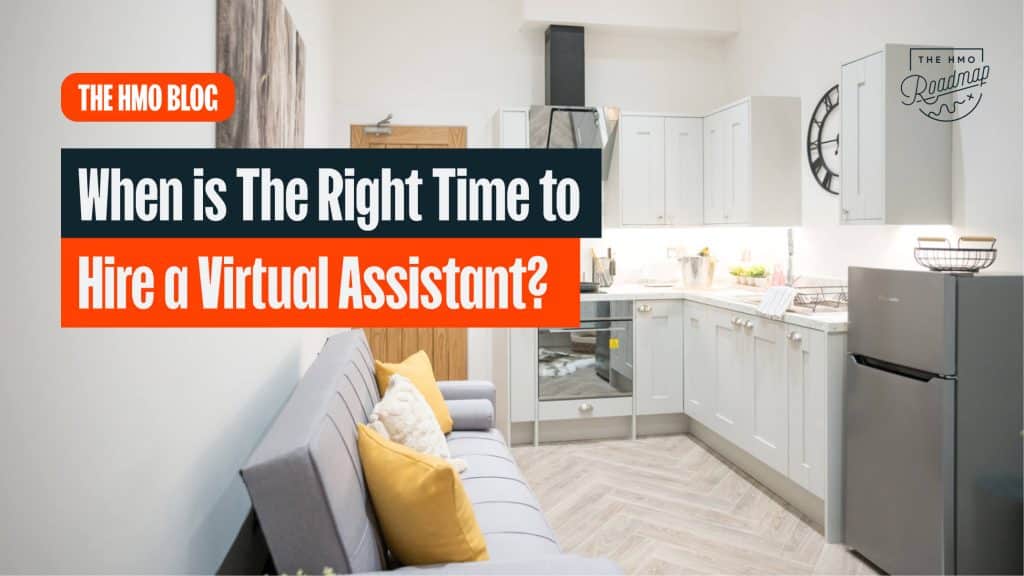
Photo by Dragon Property
A question we hear all the time from property investors is: When is the right time to hire a virtual assistant?
Before we dive into timing, let’s clarify what we mean by VA, because it’s a broad term. A virtual assistant (VA) is someone who supports you remotely, often flexibly, and their skillset can vary hugely. Some are generalists – administrators who can turn their hand to a bit of everything, and others are specialists who focus only on lettings compliance, operations, marketing, for example.
So, when is the right time to bring a VA onboard?
Here’s the short answer: as soon as possible.
Not necessarily full-time. Not necessarily highly specialised. But early. And here’s why.
Your property portfolio is a business
Even if you have a couple of HMOs and you don’t have a ‘brand’, you’re still running a business with clients, obligations, income and expenditure. And businesses need support if they’re going to grow.
In the early stages, however, cashflow is usually tight. You’re unlikely to hire a seasoned operations manager from day one. More often, you’ll start with flexible, general support by the hour. Someone who can help with your social media, diary, inbox, perhaps scour the property portals for you.
The great thing about hiring a VA for early-stage support is that you’re training and building the muscle that matters most in business growth: delegation.
Delegation is a skill – and many property investors struggle with it
Most of us aren’t taught how to delegate. We are conditioned to do it all ourselves and to believe that being busy and working hard is how we are rewarded – financially and with a sense of worth.
And when you’ve built your portfolio from scratch, you know every detail. You’ve been on every viewing. You’ve dealt with every rogue tenant and fixed every boiler. It’s natural to think: “No one else can do this as well as me.”
But that’s a lie we tell ourselves to stay in control and feel important – and it’s the very thing that keeps you stuck.
Entrepreneur Daniel Priestley talks about two types of people you can hire: Underlings and Overlings. Underlings handle general tasks – they’re cost-effective and useful for everyday support. Overlings, on the other hand, are highly skilled in areas where you’re not. As your business grows, it’s the Overlings you’ll want to bring in – the ones who are better than you at specific things and can help you take your business to the next stage.
Let’s be honest. You’re probably not the best person to handle lettings compliance. If you get this wrong, the financial repercussions could far outweigh the annual cost of hiring a specialist in this area. What you are good at is the stuff that grows your business: spotting opportunity, structuring deals, adding value to properties.
So the sooner you lean into being a leader in your business, and away from the stuff that drains you, the better for your business – and your mental health.
The cost of NOT getting help
We talk a lot about the personal cost of not building a team, and for good reason.
- Overwhelm
- Burnout
- Zero contingency if you get ill or want to take a holiday
- No time to focus on strategy or growth
But what we don’t talk about enough is the personal cost of building a team. It’s uncomfortable. Scaling forces you to grow up as a business owner. You’ve got to make decisions that affect other people. Be accountable. Communicate well. Handle mistakes. Give feedback. Keep your team motivated and connected.
It’s confronting. That’s why a lot of investors stay in the “I’ll do it myself” phase for too long, even when they’re desperate for help, and even after they’ve hired a VA – they disconnect, become unresponsive and the VA/client relationship breaks down.
Before hiring a VA, ask yourself – am I ready to show up for this person? Am I committed to making it work?
Is this YOU?
- You’re still answering messages on SpareRoom
- You’re still doing your own viewings
- You’re buried in tenant WhatsApps
- Your inbox is your filing system
- You’ve become a glorified property manager, not an investor
- You’ve no idea when your compliance needs renewing
- You’re missing out on deals because you’ve got no bandwidth to analyse them
- You’re constantly in chaos, firefighting instead of growing
If any of these ring true, it’s time. You don’t need a portfolio of 50 properties to justify a VA. You just need to be ready to let go of the idea that you’re the only one who can do it all.
Start small, start smart
Hiring a VA doesn’t mean handing over the keys to your portfolio on day one. Start with the low-hanging fruit:
Tasks you hate
Tasks that are easy to teach
Tasks that drain your time but don’t require your genius
Then build from there. And get comfortable with the discomfort, because if you wait until you’re drowning to ask for help, chances are you’ll hire badly, delegate poorly, and micromanage to the point of frustration.
This is the work
Building a property portfolio is only part of the journey. Building the team to run it – that’s where real growth happens.
Many of the investors and developers we support started out thinking they just needed an extra pair of hands. And gradually they hired our highly skilled VAs to focus on specific parts of their business.
I’ll leave you with this – a quote from Steven Bartlett that every investor should memorise:
“I shouldn’t be doing that. Someone else can solve that problem. I’m not saying that to be an arrogant arsehole or because I have delusions of grandeur. I’m saying that because it’s my sole responsibility to defend, protect and conserve my time. Nothing matters more. My time is all I have.”
Well said.
Feel free to contact me here if you’d like to discuss specialist virtual assistance in more detail. I hope you found this information helpful!

About the Author:
Jane Scroggs is the founder of Beam Virtual Property Support, in partnership with The HMO Roadmap. Her team of virtual assistants handles all aspects of lettings, compliance, credit control, and property maintenance, always focused on streamlining your operations. Learn more about Jane here.